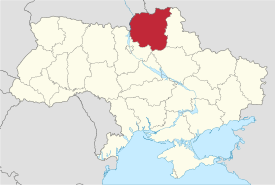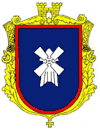Chernihiv Oblast
| Chernihiv Oblast Чернігівська область Chernihivs'ka oblast' | |||
|---|---|---|---|
| Oblast | |||
| |||
| Nickname(s): Чернігівщина (Chernihivshchyna) | |||
 | |||
| Coordinates: 51°20′N 32°04′E / 51.34°N 32.06°ECoordinates: 51°20′N 32°04′E / 51.34°N 32.06°E | |||
| Country |
| ||
| Established | 15 October 1932 | ||
| Administrative center | Chernihiv | ||
| Largest cities | Chernihiv, Nizhyn, Pryluky | ||
| Government | |||
| • Governor | Valeriy Kulich[1] (Petro Poroshenko Bloc[2][1]) | ||
| • Oblast council | 90 seats | ||
| Area | |||
| • Total | 31,865 km2 (12,303 sq mi) | ||
| Area rank | Ranked 3rd | ||
| Population (2015) | |||
| • Total | 1,055,673 | ||
| • Rank | Ranked 21st | ||
| • Density | 33/km2 (86/sq mi) | ||
| Demographics | |||
| • Official language(s) | Ukrainian | ||
| • Average salary | UAH 767 (2006) | ||
| Time zone | EET (UTC+2) | ||
| • Summer (DST) | EEST (UTC+3) | ||
| Postal code | 14-17xxx | ||
| Area code | +380 46 | ||
| ISO 3166 code | UA-74 | ||
| Vehicle registration | СВ | ||
| Raions | 22 | ||
| Cities (total) | 44 | ||
| • Regional cities | 3 | ||
| Urban-type settlements | 34 | ||
| Villages | 1494 | ||
| FIPS 10-4 | UP02 | ||
| Website |
www.chernigivstat.gov.ua chor.gov.ua | ||
Chernihiv Oblast (Ukrainian: Чернігівська область, translit. Chernihivs’ka oblast’; also referred to as Chernihivshchyna - Ukrainian: Чернігівщина) is an oblast (province) of northern Ukraine. The administrative center of the oblast is the city of Chernihiv however within the entire Oblast are 1,511 settlements of various sizes ranging from large cities to very small villages. Population: 1,055,673 (2015 est.)[3]
Geography
The total area of the province is around 31,900 km².
The oblast is bordered on the west by the Kiev Reservoir of the Dnieper River and Kiev Oblast, by the Sumy Oblast to the east, and the Poltava Oblast to the south. The northern border of the oblast is part of Ukraine's international border abutting Belarus's Homyel Voblast in the north-west and the Russian Bryansk Oblast in the north-east, respectively.
The oblast is bisected into northern and southern sections by the Desna River, which enters the Dnieper just north of the Kiev city limits.
History
Chernihiv Oblast was created as part of the Ukrainian Soviet Socialist Republic on 15 October 1932.
The capital city of Chernihiv has known human settlement for over 2,000 years, according to archaeological excavations. The Chernihiv Oblast comprises a very important historical region, notable as early as the Kievan Rus' period, when the cities of Chernihiv and Novhorod-Siverskyi were frequently mentioned. The city of Chernihiv was the second most important Ukrainian city during the Rus' period of Ukrainian history, often serving as a major regional capital. Danylo of Chernihiv wrote of his pilgrimage to Jerusalem during this era. The numerous architectural monuments of the city bear witness to the invasions suffered, including those by the Tatars/Mongols, Lithuanians, Poles, Russians, and Nazis. On the territory of the region took place numerous tragic events such as Battle of Kruty, Tragedy of Kryukivka, and many others.
The oblast is located in the historic region of Polesia (Ukrainian: Полісся, translit. Polissia).
Administrative Subdivisions
The following data incorporates the number of each type of administrative divisions of the Chernihiv Oblast:
- Administrative Centre - 1 (Chernihiv)
- Raions — 22;
- City raions — 3 (including the Oblast's administrative centre);
- Settlements — 1534, including:
- Villages — 1489;
- Cities/Towns — 45, including:
- Urban-type settlement — 30;
- Cities — 15, including:
- Cities of oblast' subordinance — 3;
- Cities of raion subordinance — 12;
- Selsovets — 525.
The local administration of the oblast is controlled by the Chernihiv Oblast Rada. The governor of the oblast is the Chernihiv Oblast Rada speaker, appointed by the President of Ukraine.

Important cities
- Main cities
-
 Chernihiv* (294,727)
Chernihiv* (294,727) -
 Nizhyn* (72,422)
Nizhyn* (72,422) -
 Pryluky* (58,456)
Pryluky* (58,456) -
 Bakhmach (18,798)
Bakhmach (18,798) -
 Nosivka (14,185)
Nosivka (14,185) -
 Novhorod-Siversky* (14,025)
Novhorod-Siversky* (14,025)
- – regional municipalities
- Other cities
- Borzna (historical city)
- Kozelets (historical city)
- Liubech (historical city of Medieval Ages)
- Baturyn (Hetman residence and fort)
Raions
The raions (districts) of the Chernihiv Oblast include:
The Slavutych municipality is located in Chernihiv Oblast on the eastern bank of the Dnieper, but officially belongs to Kiev Oblast (being an administrative exclave).
Demographics
The current estimated population of the oblast is around 1,055,673 (as of 2015).
The population of the oblast is predominantly Ukrainian, with minority Belarusian and Russian populations concentrated in the northern districts.
The province has experienced long-term population decline. The population has fallen 23% from the 1959 figure of 1,554,000, the steepest decline of any Ukrainian oblast. It has the lowest population density in the country.
Age structure
- 0-14 years: 12.9%
 (male 70,680/female 67,487)
(male 70,680/female 67,487) - 15-64 years: 68.4%
 (male 352,230/female 378,864)
(male 352,230/female 378,864) - 65 years and over: 18.7%
 (male 61,722/female 138,277) (2013 official)
(male 61,722/female 138,277) (2013 official)
Median age
- total: 42.8 years

- male: 38.5 years

- female: 46.9 years
 (2013 official)
(2013 official)
Economy
Industry
The economy of the Chernihiv Oblast mostly deals with petroleum and natural gas extraction, transport, machinery, tobacco and textile industry. A major tobacco factory is situated in Pryluky. Cities of Bakhmach and Nizhyn are the important railway junctions on the route from Russia and Belarus to South-Eastern Europe. There are notable machinery and electronics industries in Chernihiv. Chernihiv also has a beer brewery producing beer under the name "Chernihivske".
Religion
The religion among believers in the oblast is overwhelmingly Eastern Orthodox. A substantial percentage of the population is atheist. Small minorities of Ukrainian Catholics, Roman Catholics (including the descendants of earlier Polish colonists), and recent converts to Protestantism are also present.
Culture and tourist attractions
There are a few outstanding historical Orthodox churches and buildings in Chernihiv, Novhorod-Siverskyi, Liubech, Nizhyn (Nezhyn) and Koselets' (an city of Ancient Rus', older than Kiev). Nizhyn is an historical cossack city and home to a university.
- Antoniyev caverns
- Saviour's Transfiguration Cathedral
- Hustynskyi monastery
- Knyazhyi hrad
Chernihiv region was famous for its specific style of folk icon-painting. Brightness and realistic depictions of the saints were typical for it, with red and hot yellow paints used. The icons were decorated by flowers which reminded of Slavonic pre-Christian traditions. The icons from Chernihiv region were spread outside its territory. Many of them are preserved in the Museum of Ukrainian home icons of the Radomysl Castle.
Nomenclature
Most of Ukraine's oblasts are named after their capital cities, officially referred to as "oblast centers" (Ukrainian: обласний центр, translit. oblasnyi tsentr). The name of each oblast is a relative adjective, formed by adding a feminine suffix to the name of respective centre city: Chernihiv is the centre of the Chernihivs’ka oblast’ (Chernihiv Oblast). Most oblasts are also sometimes referred to in a feminine noun form, following the convention of traditional regional place names, ending with the suffix "-shchyna", as is the case with the Chernihiv Oblast, Chernihivshchyna.
See also
References
- 1 2 (in Ukrainian) CEC appointed date for elections to the county, which claims Korban, Ukrayinska Pravda (28 May 2015)
- ↑ "Extraordinary parliamentary election on 26.10.2014: Data on vote counting at percincts within single-mandate districts". Central Election Commission of Ukraine. Archived from the original on 9 October 2014.
Парламентські вибори: Кандидати на мажоритарних округах [Parliamentary Elections: Candidates for Majority Districts] (in Ukrainian). RBK Ukraine. 2014. Archived from the original on 5 February 2015. - ↑ "Чисельність наявного населення України (Actual population of Ukraine)" (PDF) (in Ukrainian). State Statistics Service of Ukraine. Retrieved 1 July 2016.
- Kardash, Peter. Ukraine and Ukrainians. Ed. Peter Lockwood. Melbourne: Fortuna Publishers, 1988.
- (1972) Icтopia мicт i ciл Укpaїнcькoї CCP - Чернiгiвськa область (History of Towns and Villages of the Ukrainian SSR - Chernihiv Oblast), Kiev. (in Ukrainian)
- Information Card of the Region - Official site of the Cabinet of Ministers of Ukraine
- Богомолець. О. "Замок-музей Радомисль на Шляху Королів Via Regia". — Київ, 2013
External links
- Very detailed map of Chernigov Guberniya as in 1910 Latinised placenames
- Chernihiv Oblast State Administration (in Ukrainian)
- Economic Portal of Chernihiv Region
- patent.net.ua - Symbols of Chernihiv Oblast
| Adjacent places of Chernihiv Oblast | ||||
|---|---|---|---|---|
 |
Gomel Region, |
Bryansk Oblast, |
 | |
| Kiev Oblast | |
Sumy Oblast | ||
| ||||
| | ||||
| Poltava Oblast | ||||

